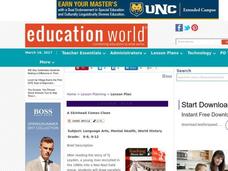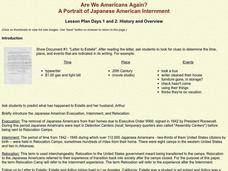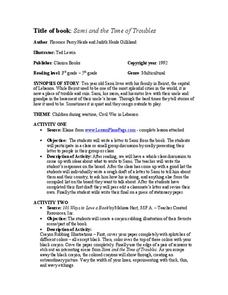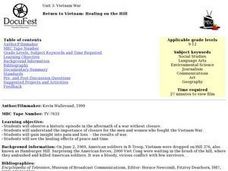Curated OER
Japan's Place In The World
Students conduct research into the history of th Japanese rise to economic power. They use a variety of sources for information and engage in a variety of in class and out of class activities.
Curated OER
A Skinhead Comes Clean
Students draw parallels between the Nazi movement that inspired the Holocaust and the Neo-Nazi movement of today. They can also write and submit email questions to TJ via a Web site.
Curated OER
Stop the Bus: Confronting Our Assumptions About Muslims in America
High schoolers explore Virginia Interfaith Center's A More Perfect Union "Misunderstanding" Ad Campaign, view two episodes of PBS America at a Crossroads series, examine historical context of colonialism and geo-political tensions in...
Curated OER
U.S. History: The Second Great Migration
Students examine the migration of rural African Americans to northern cities following World War !!. After predicting the effects of cultural and economic factors, they write essays explaining the impact of migration on communities and...
Curated OER
Are We Americans Again? A Portrait of Japanese American Internment
Young scholars study letters and images of the Japanese American Interment during World War II. They discuss the issues presented.
Curated OER
The True Cost of Coffee
Young scholars examine the economic, health, and environmental risks of a one-crop economy in the developing world. They explain how or why it can be challenging for people of one culture to understand the lifestyle of a different...
Curated OER
Modern Movements
Students analyze the art of Jacob Lawrence. For this art analysis lesson, students examine a art from Jacob Lawrence. In this art analysis lesson, students complete image based discussion activities and two related activities.
Curated OER
Map Lesson Plan
Fourth graders locate and label major sites related to the Revolutionary War in the Hudson River Valley. They examine topographical features of each site and list a few of these features and list two advantages of each military site.
Curated OER
Shakespeare's Macbeth
After reading Act II of The Tragedy of Macbeth, give your class this prompt to complete. One other question is listed along with information regarding the divine right of kings. A full plan is not written out here, but the prompt is a...
Curated OER
The assassination of the Archduke: Exploring Perspectives
Use political cartoons for a multiple-perspectives strategy, as pupils learn about the assassination of Archduke Franz Ferdinand. After an anticipatory discussion, they are split into 2 groups. The class reads a primary source account...
Curated OER
Free to Speak and Free to Post?
Students research on the Web and in books with city statutes or call city officials to find out the local ordinance on posting signs on utility poles. If illegal, students explore what has happened elsewhere when citizens decided to...
Curated OER
Science Fiction
Young scholars write a science fiction story. In this science fiction lesson, students read selections of science fiction and compare them to supernatural stories from the Bible. Young scholars identify themes and discuss...
Curated OER
Sami and the Time of Troubles
Pupils read Florence Parry Heide and Judith Heide Gilliland's, Sami and the Time of Troubles before discussing it as a class. They brainstorm ideas for a letter to the main character, Sami. Next, they write a rough draft of a letter to...
Curated OER
Hiroshima, From All Sides
Students comprehend how the Atomic Bomb affected humanity and ended WWII. They comprehend how the Atomic Bomb affected: scientists, Japanese citizens, and US leaders. Students receive a copy of Hiroshima, Readers Theater Rubiv. They...
Curated OER
Indians at Arras
Students research the role played by Britsih Empire troops in the First World War. They analyze the natrue, origin and purpose of propaganda. Students watch the "Newsreel", they are asked to write down everything that they can infer...
Curated OER
Scapegoating
Middle schoolers examine how stereotypes, prejudices and discriminatory practices lead to individuals and groups being blamed for events. They are introduced to the internment of Japanese Americans during World War II.
PBS
Women's History: Clara Barton
Students investigate Clara Barton's contributions to society. In this Clara Barton lesson plan, students watch videos, listen to lectures, and conduct research regarding Clara Barton's life and her possible authorship of a Civil War...
Curated OER
The Great Debate: Internationalists vs. Isolationists
Students examine the opposing arguments of the isolationists and internationalists in 1941. For this debate lesson, the students are divided into two opposing groups representing a position in a live, in- class debate. After the debate,...
Curated OER
The Holocaust in Art, Photography and Writing
Students explore paintings, photographs and writings about the Holocaust using the internet. Researching the various websites, they will discover different human experiences of Holocaust victims. After researching, students write about...
Curated OER
What Made George Washington a Good Military Leader? Powers and Problems
Students list qualities they believe made George Washington an effective military leader. They discuss difficulties Washington faced as Commander-in-Chief and how he responded to the difficulties he faced as the leader of the Continental...
Curated OER
The Treaty of Versailles and the Effects of WWI
Help your historians comprehend perspectives of the Versailles Treaty by paralleling the event to a peace meeting in the classroom, which 2 participants aren't invited to. Consider making it more relatable: instead of the class going to...
Canadian War Museum
Comparing Primary and Secondary Sources
This simple two-day instructional activity introduces learners to the differences between primary and secondary sources. The instructional activity includes group work that explores the similarities and differences, and the...
Curated OER
Return to Vietnam: Healing on the Hill
Students view a film about soldiers returning to Vietnam years after the war. They discover the need of closure by the soldiers because the war was not won. They examine the results of the war and answer questions to complete the lesson.
Curated OER
Houghton Mifflin Social Studies/Chapter 11, Lesson 2: New Uses of Science and Technology (pp. 255-259)
Fourth graders reflect upon the development of technology and how it has effected the lives of Californians. Drawings and writings are used as media for self-expression. The areas of focus are aviation, sea exploration, and farming.























